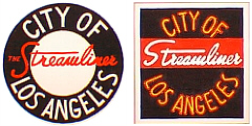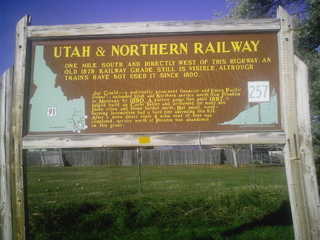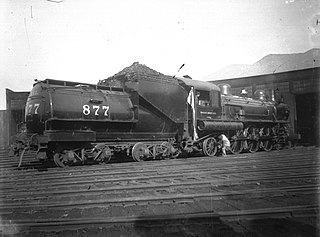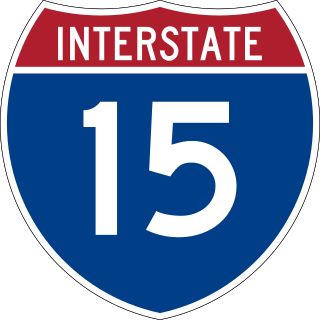
West Yellowstone is a town in Gallatin County, Montana, United States, adjacent to Yellowstone National Park. The population was 1,272 at the 2020 census. West Yellowstone is served by Yellowstone Airport. It is part of the Bozeman, MT Micropolitan Statistical Area.

The City of Portland was a named passenger train on the Union Pacific Railroad between Chicago, Illinois, and Portland, Oregon. The first trip left Portland on June 6, 1935, using the streamlined M-10001 trainset. With only one set of equipment, the train left each terminal six times a month. A broken axle derailed the trip that left Chicago on July 23, 1935, and the repaired train resumed service with the trip leaving Portland on February 6, 1936. In May 1936 it started running five times a month instead of six, allowing more time in Chicago between trips.

The Empire Builder is a daily long-distance passenger train operated by Amtrak between Chicago and either Seattle or Portland via two sections west of Spokane. Introduced in 1929, it was the flagship passenger train of the Great Northern Railway and was retained by Amtrak when it took over intercity rail service in 1971.

U.S. Route 91 or U.S. Highway 91 is a 172.7-mile-long (277.9 km) north–south United States highway running from Brigham City, Utah, to Idaho Falls, Idaho, in the U.S. states of Idaho and Utah. Despite the "1" as the last digit in the number, US 91 is no longer a cross-country artery, as it has mostly been replaced by Interstate 15. The highway currently serves to connect the communities of the Cache Valley to I-15 and beyond. Prior to the mid-1970s, US 91 was an international commerce route from Long Beach, California, to the Canada–US border north of Sweetgrass, Montana. US 91 was routed on the main streets of most of the communities it served, including Las Vegas Boulevard in Las Vegas and State Street in Salt Lake City. From Los Angeles to Salt Lake, the route was built along the corridor of the Arrowhead Trail. A portion of the highway's former route in California is currently State Route 91.

The Coast Starlight is a long-distance passenger train operated by Amtrak on the West Coast of the United States between Seattle and Los Angeles via Portland and the San Francisco Bay Area. The train, which has operated continuously since Amtrak's formation in 1971, was the first to offer direct service between Seattle and Los Angeles. Its name is a combination of two prior Southern Pacific (SP) trains, the Coast Daylight and the Starlight.

The City of Los Angeles was a streamlined passenger train between Chicago, Illinois, and Los Angeles, California via Omaha, Nebraska, and Ogden, Utah. Between Omaha and Los Angeles it ran on the Union Pacific Railroad; east of Omaha it ran on the Chicago and North Western Railway until October 1955 and on the Milwaukee Road thereafter. The train had number 103 westbound and number 104 eastbound.

The Utah & Northern Railway is a defunct railroad that was operated in the Utah Territory and later in the Idaho Territory and Montana Territory in the western United States during the 1870s and 1880s. It was the first railroad in Idaho and in Montana. The line was acquired by a Union Pacific Railroad subsidiary, the Oregon Short Line, and is today operated by the Union Pacific Railroad as the Ogden Subdivision, part of the Pocatello Subdivision, and the Montana Subdivision.

The North Coast Limited was a named passenger train operated by the Northern Pacific Railway between Chicago and Seattle via Bismarck, North Dakota. It started on April 29, 1900, and continued as a Burlington Northern Railroad train after the merger on March 2, 1970 with Great Northern Railway and the Chicago, Burlington and Quincy Railroad. The next year, it ceased operations after the trains which left their originating stations on April 30, 1971, the day before Amtrak began service, arrived at their destinations.

Idaho Falls Regional Airport is two miles north-northwest of downtown Idaho Falls, Idaho, United States. It is locally known as Fanning Field. It is the second-busiest airport in Idaho after Boise Airport.

The Desert Wind was an Amtrak long-distance passenger train that ran from 1979 to 1997. It operated from Chicago to Los Angeles as a section of the California Zephyr, serving Los Angeles via Salt Lake City; Ogden, Utah; and Las Vegas.

The Pioneer was an Amtrak long-distance passenger train that ran between Seattle and Chicago via Portland, Boise, Salt Lake City, and Denver. Operating from 1977 to 1997, the Pioneer was the last passenger rail route to serve Wyoming, Southern Idaho, or Eastern Oregon.

The Olympian and its successor the Olympian Hiawatha were passenger trains operated by the Chicago, Milwaukee, St. Paul and Pacific Railroad between Chicago and the Pacific Northwest. The Olympian operated from 1911 to 1947 and was, along with its running mate the Columbian, the first all-steel train to operate in the Pacific Northwest. The streamlined Olympian Hiawatha operated from 1947 to 1961 and was one of several Milwaukee Road trains to carry the name "Hiawatha". The Olympian Hiawatha was designed by industrial designer Brooks Stevens and included the distinctive glassed-in "Skytop" observation-sleeping cars. It later featured full-length "Super Dome" cars.

The Oregon Short Line Railroad was a railroad in Wyoming, Idaho, Utah, Montana and Oregon in the United States. The line was organized as the Oregon Short Line Railway in 1881 as a subsidiary of the Union Pacific Railway. The Union Pacific intended the line to be the shortest route from Wyoming to Oregon and the Pacific Northwest. Construction was begun in 1881 at Granger, Wyoming, and completed in 1884 at Huntington, Oregon. In 1889 the line merged with the Utah & Northern Railway and a handful of smaller railroads to become the Oregon Short Line and Utah Northern Railway. Following the bankruptcy of Union Pacific in 1897, the line was taken into receivership and reorganized as the Oregon Short Line Railroad (“OSL”). The OSL became a part of the Union Pacific System in the Harriman reorganization of 1898.

The City of St. Louis was a streamlined passenger train operated by the Union Pacific Railroad and the Wabash Railroad between St. Louis, Missouri, and Los Angeles, California. It operated from 1946 to 1971.

Interstate 15 (I-15) is a part of the Interstate Highway System that runs from San Diego, California, to Sweetgrass, Montana. In Idaho, the Interstate Highway runs exactly 196 miles (315 km) from the Utah state line near Woodruff north to the Montana state line at Monida Pass. I-15 is the primary north–south highway of Eastern Idaho. The Interstate Highway connects Pocatello and Idaho Falls, the fourth and fifth largest cities in Idaho, and the smaller county seats of Malad City, Blackfoot, and Dubois. I-15 connects all of those cities with Salt Lake City to the south and Butte to the north. The Interstate has business loops through McCammon, Inkom, Pocatello, Blackfoot, and Idaho Falls.

The Los Angeles Limited was a named passenger train in the United States. It was operated by the Union Pacific Railroad from 1905 to 1954.
The Las Vegas Limited was a short-lived weekend-only passenger train operated by Amtrak between Los Angeles, California, and Las Vegas, Nevada. It was the last in series of excursion trains run by Amtrak between 1972–1976 serving the Los Angeles–Las Vegas market. Low patronage led to the train's withdrawal after three months. Amtrak returned to the Las Vegas market in 1979 with the Desert Wind, a daily train between Los Angeles and Ogden, Utah.
National Parks Airways was an airline operating in the US states of Idaho, Montana, and Utah in the 1920s and 1930s.

Transportation in Montana comprises many different forms of travel. Montana shares a long border with Canada, hence international crossings are prevalent in the northern section of the state; there are 13 road crossings and one rail crossing.

The Overland Limited was an American named passenger train which for much of its history was jointly operated by three railroads on the Overland Route between San Francisco and Chicago. The Southern Pacific Railroad handled the train west of Ogden, Utah, the Union Pacific Railroad between Ogden and Omaha, Nebraska/Council Bluffs, Iowa, and east of the Missouri River to Chicago it was operated by the Chicago and North Western Railway as well as, for a few years starting in 1955, by the Chicago, Milwaukee, St. Paul and Pacific Railroad.


















